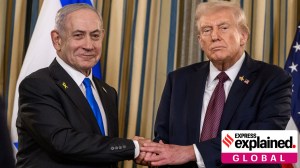quot;India is a swing statequot;
January 23: When Professor Samuel P Huntington, author of the seminal work Clash of Civilisations and the Re-Making of the World Order' del...

January 23: When Professor Samuel P Huntington, author of the seminal work Clash of Civilisations and the Re-Making of the World Order8217; delivered his lecture at the Nehru Centre today, the clash wasn8217;t civilisational: it was intellectual, and it centered around him and Muslim scholar Rafiq Zakaria.
Huntington described the volatile world situation as one which would witness a grouping of culturally similar nation-states and conflicts between different ways of life. Zakaria argued that India8217;s assimilative powers ensured the absence of any long-standing ethnic, regional or linguistic conflict and the upholding of noble values. 8220;Hinduism bases itself on co-existence and a broad humanism. Hence, India8217;s multi-culturalism and genuine secularism,8221; Zakaria said. Speaking of an Islamic resurgence, the 8220;increasing Islamic and Islamist behaviour of Muslim nations8221; and 8220;their disproportionate role in ethnic conflict worldwide,8221; Huntington said the unusually high growth in Muslim population and the rising number of restless Muslim youth could lead to an escalation of conflict and relations between Islamic nations and other major states could become 8220;distant and acrimonious, and at times antagonistic and violent.8221;
But Zakaria pointed out that internecine conflict in the Muslim world was so large that it was difficult for Muslims to unite. To this, Hungtinton said Islam certainly wasn8217;t a monolithic organisation, but there surely was a 8220;consciousness without cohesion.8221;
Huntington said the best recourse for India in the emerging global scenario, where cultural affinities would take precedence over everything else, is to align itself with the United States. But, he did not address fears about the USA8217;s hegemonisitic tendencies.An international order based on co-operation between their core states is the surest safeguard against a Third World War, he said. Huntington described India as the core state of an ancient and great, mainly Hindu, civilisation, which also absorbed Muslim, Buddhist and Christian elements, thus emerging as 8220;unique.8221; Considering the present civilisational break-up 8212; the major ways of life being Western, Orthodox Christian, Japanese, Muslim, Indian, Latin American and African 8212; he felt India was likely to be a lonely country in the wake of a global reconfiguration of relations along cultural lines.
Such a swing state,8217; he said, could either stand aloof, or look inward and be ignored, or benefit from other conflicts by playing one side against the other. The fourth way out, according to him, is the establishment of a cross-cultural relationship with other major powers. No doubt, India could join a challenger civilisation8217; and be part of the emerging non and anti-Western grouping of nations, but he said it was hard to see what benefits such a stand would bring.
- 01
- 02
- 03
- 04
- 05































